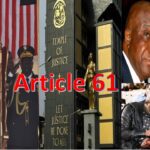In 2020, Sierra Leone President Maada Bio took a bold step by issuing a travel ban on former President Ernest Bai Koroma and 120 others over allegations of corruption and economic malfeasance during his time in office. This move, supported by a detailed White Paper, marked a significant effort towards accountability and transparency in governance. As Liberia prepares for a new leadership under President-elect Amb. Joseph Nyumah Boakai, the question arises: could similar measures be taken against the outgoing administration led by President George Weah?
Sierra Leone’s decision to ban Koroma and others was a response to findings from three commissions of inquiry that investigated the assets of vice presidents, ministers, and heads of government agencies who served in Koroma’s administration from 2007 to 2018. The White Paper laid out compelling evidence of corruption and abuse of office, prompting the government to restrict the travel of those implicated.
Examining Liberia’s Situation:
As Liberia transitions to a new administration, there is a growing call for accountability and a thorough investigation into allegations of corruption and mismanagement of public office during President Weah’s tenure. President-elect Amb. Joseph Nyumah Boakai faces the task of ensuring that Liberia’s government addresses these concerns and upholds the principles of good governance.
Potential for a Travel Ban:
The question of whether President-elect Boakai can issue a travel ban on George Weah and his officials depends on the findings of investigations into corruption and malfeasance. The precedent set by Sierra Leone demonstrates that such actions are possible when backed by concrete evidence. Boakai’s administration would need to establish a clear and transparent process for investigating allegations against the outgoing officials, and if wrongdoing is proven, consider imposing travel restrictions.
Establishing Commissions of Inquiry:
To achieve this, President-elect Boakai could follow the example set by Sierra Leone and establish commissions of inquiry to thoroughly investigate allegations of corruption and abuse of office. These commissions would be tasked with examining the financial transactions and assets of key officials in the Weah administration. The findings would then serve as the basis for any subsequent actions, including the possibility of travel bans.
Publishing a White Paper:
In the spirit of transparency and accountability, President-elect Boakai’s administration could commit to publishing a White Paper outlining the findings of the investigations. This document would provide the Liberian citizens with a comprehensive understanding of the extent of corruption and mismanagement within the government. Additionally, it would demonstrate the commitment of the new administration to holding officials accountable for their actions.
Conclusion:
As President-elect Amb. Joseph Nyumah Boakai assumes office, the eyes of the Liberian people and the international community are on his commitment to fostering accountability and transparency. Taking inspiration from Sierra Leone, the implementation of a travel ban on officials implicated in corruption could be a crucial step in rebuilding public trust and ensuring that Liberia’s government operates in the best interests of its citizens. The establishment of commissions of inquiry and the publication of a White Paper would be vital tools in this pursuit of justice and accountability.




